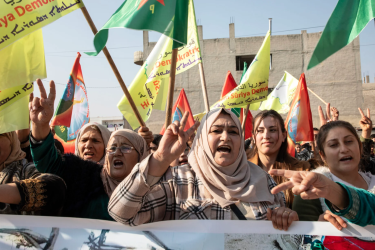Syria

Syria: Building an anticapitalist economy in Rojava
Azize Aslan discusses the economic order and class relations in Rojava (North and East Syria) and the role class struggle plays in the revolution.

Revolutionary Left Current: Syria at a crossroads — Towards freedom or tyranny
Revolutionary Left Current — The interim constitutional declaration has entrenched the very opposite of the goals and roots of the Syrian revolution.

Post-Assad Syria: Entering the era of ‘Assadism without Assad’
Yaqoub Abdul Majeed — After more than five decades of the Assad family’s rule, Syria appears to be entering a phase of “Assadism without an Assad”.

The Kurdish issue, Öcalan’s call and developments in Rojava
Hamit Bozarslan talks about the historical roots of the Kurdish issue, Abdullah Öcalan’s call for the PKK to disarm and recent developments in Northern and Eastern Syria.

So-called axis of resistance: Which way forward for Palestinian liberation?
Joseph Daher discusses regional and multipolar imperialism, the limits of Iranian resistance, and the international path toward Palestinian liberation.

The Syrian revolution, Iran and Israel: Squaring the circle, refuting myths
Michael Karadjis breaks down some myths surrounding Israel, Iran and the fall of the Assad regime.

‘We will fight with all our strength’: As Islamists oust Assad, women’s struggle persists in Syria
Ronahi Hassan — Women in North and East Syria are continuing to fighting for their revolutionary social model, as a hope for Syria, the Middle East, and the world.

Joseph Daher: Connecting democratic and socio-economic issues in Syria to serve the 99%
Joseph Daher — The ability to improve socio-economic conditions is crucial to widen participation of the Syrian people in the struggles for democratic rights in the country. But the interim government is working in continuity with the previous regime.

After the fall: Hope amid the ruins of post-Assad Syria
Kevin B. Anderson — A few months after the epochal fall of the Assad dictatorship, Syria remains in flux. Nonetheless, some broad outlines of where Syria is going can be discerned.

Geopolitics of genocide: An interview with Rafeef Ziadah
Rafeef Ziadah — The genocide in Gaza lays bare the harsh realities of modern geopolitics, highlighting the mechanisms of power in a world shaped by imperial ambitions and the strategic exploitation of resources.

